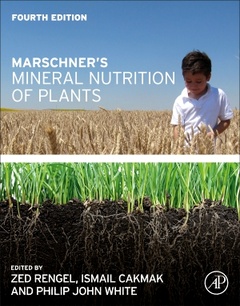Marschner's Mineral Nutrition of Plants (4th Ed.)
Coordonnateurs : Rengel Zed, Cakmak Ismail, White Philip John

An understanding of the mineral nutrition of plants is of fundamental importance in both basic and applied plant sciences. The fourth edition of this book retains the aim of the first in presenting the principles of mineral nutrition in the light of current advances.
Marschner's Mineral Nutrition of Plants, 4th Edition, is divided into two parts: Nutritional Physiology and Plant?Soil Relationships. In Part I, emphasis is put on uptake and transport of nutrients in plants, root?shoot interactions, role of mineral nutrition in yield formation, stress physiology, water relations, functions of mineral nutrients and contribution of plant nutrition to food nutritional quality, disease tolerance, and global nutritional security of human populations. In view of the increasing interest in plant?soil interactions. Part II focuses on the effects of external and internal factors on root growth, rhizosphere chemistry and biology, soil-borne ion toxicities, and nutrient cycling.
Now with color figures throughout, this bookcontinues to be a valuable reference for plant and soil scientists and undergraduate and graduate students in the fields of plant nutrition, nutritional physiology, and soil fertility.
Part I. Nutritional Physiology 1. Introduction, definition and classification of nutrients 2. Ion-uptake mechanisms of individual cells and roots: short-distance transport 3. Long-distance transport in the xylem and phloem 4. Uptake and release of elements by leaves and other aerial plant parts 5. Mineral nutrition, yield, and source-sink relationships 6. Functions of macronutrients 7. Micronutrients 8. Beneficial elements 9. Mineral nutrition on crop quality 10. Relationship between mineral nutrition, plant diseases and pests 11. Diagnosis and prediction of deficiency and toxicity of nutrients
Part II. Plant-Soil Relationships 12. Nutrient availability in soils 13. Genetic and environmental regulation of root growth and development 14. Rhizosphere chemistry influencing plant nutrition 15. Rhizosphere biology 16. Nitrogen fixation 17. Nutrient-use efficiency 18. Plant responses to soil-borne ion toxicities 19. Nutrition of plants in a changing climate
20. Nutrient and carbon fluxes in terrestrial agroecosystems
Further target audiences are professionals involved in food security and climate change research programs.
Ismail Cakmak received his PhD at the University Hohenheim in Stuttgart, Germany under the guidance of the late Prof Dr.Horst Marschner. Dr. Cakmak had a research collaboration with Prof Marschner for 12 years and they published together extensively. He is currently Professor at the Sabanci University-Istanbul, Turkey. He has published 225 peer-reviewed articles and named among the “highly cited researchers in agricultural sciences by Clarivate Analytics. He has received IFA “International Crop Nutrition Award" in 2005, Australian Crawford Fund “Derek Tribe Medal in 2007, Alexander von Humboldt Foundation-Georg Forster Research Award in 2014, International Plant Nutrition Institute-IPNI Science Award in 2016 and the World Academy of Sciences-Agricultural Science Prize in 2016. He is an elected member of “The Academy of Europe and “The Science Academy of Turkey.
Professor Philip John White FLS FRSE graduated from Oxford University with a BA in Biochemistry in 1983 and was awarded a PhD in Natural Sciences (Botany) from the Uni
- Offers new content on the relationship between climate change, soil fertility and crop nutrition
- Keeps overall structure of previous editions
- Includes updates in every chapter on new developments, ideas and challenges
Date de parution : 12-2022
Ouvrage de 816 p.
21.4x27.6 cm
Thèmes de Marschner's Mineral Nutrition of Plants :
Mots-clés :
Acidification; Adaptation; Agroecology; Alternative respiratory pathways; Aluminum; Anatomy; Angiosperm ionome; Animal and human health; Animal husbandry systems; Apoplasm; Arabidopsis; BNF; Bacteria; Beneficial elements; Biofortification; Biosynthesis; Breadmaking; C sequestration; C4 species; Calcium; Carbon-nutrient cycles; Cell wall stability; Cells; Cereals; Chelation; Climate change; Compartmentation; Content; Copper; Critical deficiency concentration; Critical deficiency range; Crop yield



